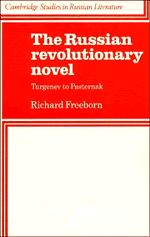2 - Proletarian heroism and intelligentsia militancy
Published online by Cambridge University Press: 04 April 2011
Summary
The two novels that illustrate the literary response to the so-called ‘first’ Russian revolution of 1905 more clearly than any others are both concerned to show how capitalist society, whether in its economic or its political forms, dominates and reifies human life. Human beings are represented as at one remove from natural surroundings, divorced from a natural, uninhibited relationship with their environment and themselves by the institutions of economic and political life that dominate them. Throughout the major prose fiction of the decade following the failure of the 1905 revolution there was a tendency to depict human behaviour as partly motiveless – the most obvious example of such an approach was the work of Leonid Andreyev, but it can also be seen in the work of Kuprin, Bunin, Serafimovich, Sologub and others – and in a quasi-impressionistic, symbolic manner that substituted behavioural representation for the psychological motivation so essential to nineteenth-century Russian realism. Arguably a smaller literature with smaller talents and smaller concerns than the literature of Dostoyevsky, Tolstoy and Chekhov, it could still lay claim to one writer of acknowledged genius and international repute in Maxim Gorky, and it was to throw up probably the most original of literary talents on the European literary scene in the pre-First World War period, Andrey Bely. The depictions of environment in their respective ‘revolutionary’ novels illustrate the evolution of manner and style that occurred in a literature that was naturally responding to the socio-economic and political forces of the time:
Every day the factory whistle bellowed forth its shrill, roaring, trembling noises into the smoke-begrimed and greasy atmosphere of the working men's suburb; and obedient to the summons of the power of steam, people poured out of little grey houses into the street. […]
- Type
- Chapter
- Information
- The Russian Revolutionary NovelTurgenev to Pasternak, pp. 39 - 64Publisher: Cambridge University PressPrint publication year: 1983

